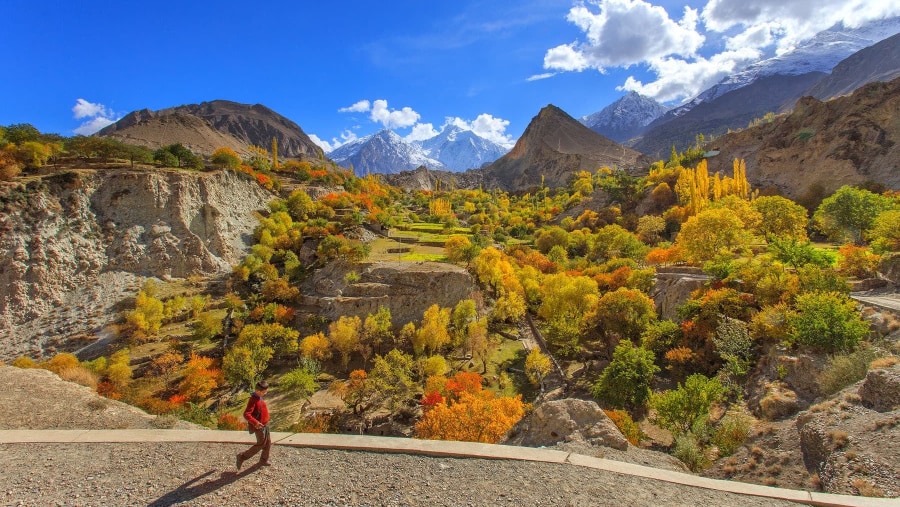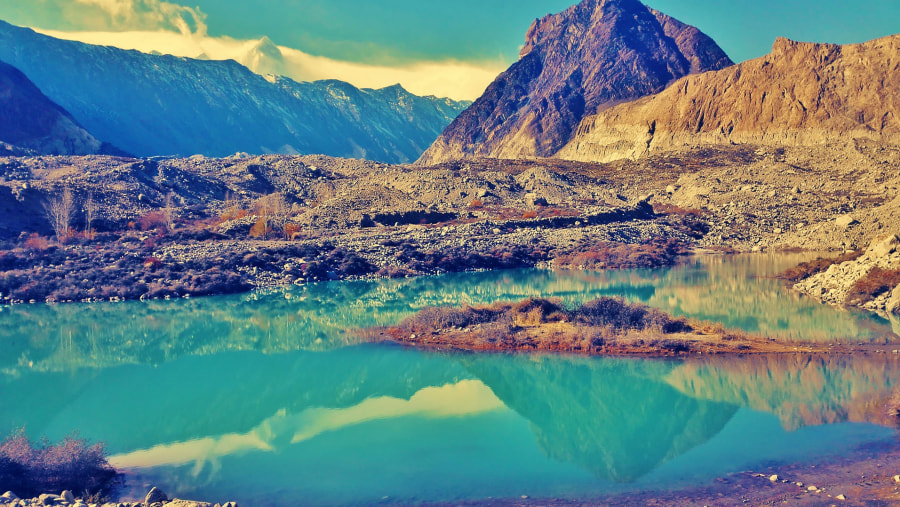7-Day Tour To The Hunza Valley, Passu & Naran Via The Karakoram Highway
Description
See the confluence of the world's highest mountain ranges: the Karakoram, the Himalayas, and the Hindu Kush as you travel along the Karakoram Highway, reputed as the 8th wonder of the world, through the dramatic, deep gorges of the Indus. Spend a few days in Hunza, inhabited by Ismaili Muslims and famous for its inhabitants' longevity & learn about the local culture.
Highlights
- Drive along the Karakoram highway
- Understand the local culture at Hunza Karimabad
- Visit Gulmit, Passu and Khunjerab pass
- Take in the breathtaking views of the famous mountain ranges
Itinerary Expand All Collapse All
-
Day 1: Islamabad - Taxila - Naran/ Besham expand_more
Morning flight to Islamabad, Pakistan’s capital city.
At the airport, you will be met by the tour representative and begin the 28km drive to Taxila, the ancient capital of the Buddhist Gandhara civilization, which is regarded as one of the most important archaeological sites on the sub-continent.
Here, visit the ruins of a former city (Sirkup), a hill-top former monastery (Julian) and the splendid site museum containing artefacts excavated from the sites. Among these are gold and silver coins from the time of Alexander the Great (326 BC).
After lunch, head towards the Karakoram Highway (KKH) via Mansehra District's beautiful lush green valleys. The highway was a joint project between Pakistan and China and took 20 years to complete. During its construction, 300 Chinese and 600 Pakistani workers lost their lives.
Overnight at the motel. (4-5 hour drive, 200 km).
-
Day 2: Besham/ Naran - Hunza Karimabad expand_more
Early morning drive to Gilgit, the capital of Pakistan’s Northern Areas. We cross a Chinese-made bridge and enter the Indus River gorge.
For centuries this branch of the Silk Route was used by the traders and Buddhist missionaries. There are many rock carving sites dating back to that time, including the carvings at Shatila.
After lunch at Chilas, we stop at Thalichi, the best viewpoint of Nanga Parbat (8125m), the 9th highest peak in the world and the second-highest in Pakistan after K2 which is also known as the Killer Mountain. There are also spectacular views of Rakaposhi (7788m) and the Haramosh Range from the same spot.
As we drive north, we reach the meeting point of the world’s three highest mountain ranges – the Karakoram, Himalayas and the Hindukush. At this amazing place, the Gilgit River also joins the mighty Indus. We follow the Gilgit River to Gilgit.
After crossing a suspension bridge over the river, we reach Kargah and visit the 7th century Buddha carved into the rock. In ancient times the Kargah Valley was used by Buddhist monks as a route to and from Taxila.
Our tour continues along the breathtaking Hunza Valley, where we will be able to see the original Silk Route used by both traders and monks.
En route, we will make a short stop at the Rakaposhi (7788m) viewpoint before arriving at Karimabad, the capital of the Hunza Valley.
Overnight at Hotel. (7-38hour drive, 180km)
-
Day 3: Hunza Karimabad expand_more
Free day in Karimabad with time for short walks to the Altit and Baltit forts and for more exploration of the Hunza Valley. There are superb views of the Karakoram Range from here - Rakaposhi 7788m, Diran 7266m, Ultar 7400m, Golden Peak 7027m, along with glimpses of the Nagar Valley on the other side of the river.
The friendly, long-lived people of the Hunza are almost self-sufficient, growing wheat, maize, apricots and walnuts and making their own clothes, shoes, and wooden and stone bowls.
In the afternoon, there will be time to walk to the Ultar Glacier by following the irrigation channel through the village or to stroll through the single-lane bazaar to enjoy more spectacular views of the mountain peaks soaring around you.
Overnight at the hotel.
-
Day 4: Hunza Karimabad - Passu (Upper Hunza Valley) expand_more
Today, take a short drive into the heart of Karakorams.
Stop at the village of Gulmit, in the shadow of the unclimbed Gulmit Tower, walk through the village fields to visit the polo ground and historic houses, and later take a short trek to the Gulkin glaciers and Borit Lake.
Our transport will meet us near Borit Lake to take us the 15km to Passu. Passu is a charming village set against a backdrop of the soaring Passu Cones and the Passu and Batura glaciers within short walking distance.
About 70 years ago, Passu was the second largest settlement in Hunza after Karimabad.
However, the glacier upstream on the Hunza River began to advance, creating a dam which later broke, washing away houses and fertile fields. Now the river occupies the major share of the valley.
There will be time for a walk through the village before overnight at a lodge. (1 hour, 50 km)
-
Day 5: Passu Glacier - Khunjerab Pass expand_more
Morning walk to the Passu Glacier and Passu Lake (45 minutes one-way).
From the snout of the glacier, there are spectacular views of Shispar (7611m) and Passu Peak (7478m).
Visit Khunjerab Pass on the Pak China border and return to the lodge for lunch.
Afterwards, visit the famous suspension bridges of Passu. These 800 feet long bridges over the Hunza River are still used by the local people.
Overnight stay.
-
Day 6: Passu - Besham / Naran expand_more
Drive back along the Karakoram Highway (KKH), following the Hunza River, enjoying the amazing views of the Karakorams.
Spend the night at Besham / Chilas on the banks of the Indus River. (6-7-hour drive, 260km)
-
Day 7: Narran/ Besham - Islamabad expand_more
Start early for the 05-hour drive along the KKH to Islamabad, with a short stop at Abbottabad for lunch.
Transfer to airport for the flight to home destination. (05 /06-hours drive, 195 km).
What's Included
Accommodation on a twin-share basis at standard category hotels in towns
Meals: half board
Transport: Air-conditioned transport on Karakoram Highway
Soft top 4x4 jeeps for Hunza excursions
Tips & Portage at airport & hotels
Entrance fees at sites & museums
English-speaking Pakistani tour guide
What's Excluded
Domestic/International airfares and airport taxes
Any expenses due to the cancellation of flights, landslides, other natural calamities or acts of God beyond our or our supplier's control
Any expense of a personal nature not mentioned above
Know before you go
- Hunza Valley is a mountainous valley located in Gilgit, an area under Pakistan's government. The main town of Hunza, Karimabad (formerly known as Baltit), is the capital and the most popular tourist destination of Hunza. As famous as the valley is for its beauty, the people of Hunza are also well-known for their friendliness and hospitality. Hunza’s tourist season is generally from May to October because, in winter, the Karakoram Highway is often blocked by the snow. Unlike most places in Pakistan, Hunza valley has a very high literacy rate of more than 90%.
Baltit Fort or Balti Fort is an ancient fort in the Hunza valley and has been on the UNESCO World Heritage Tentative List. The fort dates back to 700 years ago and has been rebuilt and altered over the centuries. It is located at a height, and one must either walk or take a jeep to reach. From the terrace of the Baltit Fort, you also have a splendid bird’s eye view of the houses of the village Karimabad.
Borith Lake is a lake located near Gulmit, Gojal, in the upper Hunza area. The altitude of Borith is roughly 2,600 m (8,500 feet) above sea level. The lake can be reached via a 2 km unpaved jeep route from Husseini village and is also accessible by a 2-3 hour trekking route directly from Ghuylkin.
- Trekking:
- Hunza valley is famous for its trekking. The second highest peak of the world, K2, is located in the Gilgit-Baltistan region, where Hunza valley is also located. There are various trekking tours which tourists can avail.
Restaurant:
Hunza is very famous for its local eateries, which are served at most restaurants located in the Karimabad market area.
Some of the names of the traditional foods are Sharbat, diram-fete, davdo, muleda, amongst many others. These dishes are cooked with pure butter and downed in oil but are prepared on occasion as they are expensive.
Shopping:
There are at least 50 shops, restaurants and hotels located on Karimabad’s bustling streets. One of the biggest attractions in this area is the variety of precious and semi-precious minerals and gemstones. Many tourists visit the Gilgit-Baltistan area for this reason.
Hotels:
From low to high budget, Hunza has them all. You can find the best hotels in Hunza.
Safety:
Hunza is very safe, and the people are known for their hospitality. Similar to all Pakistan cities, it is best to dress modestly. Women must cover their shoulders and knees, and couples should avoid public displays of affection.
Money:
Pakistan Rupees, All International Credit Card (Visa; MasterCard) are accepted in the ATM. Main Airport: Gilgit Airport, 105km from Hunza centre.
Cancellation Policy
For cancellations upto 2 days before the tour -
Refund of 80% of the tour price.Price Details
| The group size and price | |
| 1 To 7 | USD 990 Per Group |
This is a group tour | |





